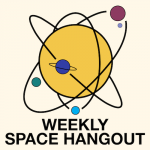Podcaster: Host : Fraser Cain ; Guest : Timothy Spuck, Kathryn Meredith, Dr. James Hammerman, Andreas Stefik, and Morgan Rehnberg
 Title: Weekly Space Hangout:The IDATA Project and Afterglow Access
Title: Weekly Space Hangout:The IDATA Project and Afterglow Access
Link: Cosmoquest: http://cosmoquest.org
You can watch the video in: http://youtu.be/qtRbPlJkagk
Description: This Week’s Stories:
- SpaceX finally does it! A used rocket puts a new satellite in orbit and then lands again!
- NASA has fleshed out it’s Mars Program plans.
- Blue Origin shows off its new capsule.
Each week we will have a random drawing for a prize package from our sponsor. Enter the code for this week into this site: https://cosmoquest.org/achievements/code for a chance to win.
This week’s code is bJHz9j. Enter it into the website to unlock the achievement and enter the contest.
Bio: Fraser Cain is the publisher of Universe Today
Host: Fraser Cain ( @fcain )
Special Guests:Timothy Spuck, Kathryn Meredith, Dr. James Hammerman and Andreas Stefik of the Innovators Developing Accessible Tools for Astronomy (IDATA) Project Team. The IDATA project aims to design and develop Afterglow Access, a new software tool that will expand accessibility beyond touch, making the universe more accessible to those with visual impairments.
Tim Spuck (email: tspuck@aui.edu) (Associated Universities Inc. STEM Education Development Officer and IDATA PI) currently serves as PI on three NSF supported programs including, Innovators Developing Accessible Tools for Astronomy, the Chile-US Astronomy Education Outreach Summit, and the Astronomy in Chile Educator Ambassadors Program. Tim also remains active within the amateur astronomy community, has directed numerous outreach efforts, and led several small-scale observatory design and construction projects. He earned his Masters degree in Science Education from Clarion University or PA, and is completing his Ed.D. in Curriculum & Instruction at West Virginia University.
Kate Meredith (Yerkes Observatory – University of Chicago, Director of Education Outreach, and IDATA Project Educator) has engaged in curriculum development and project management for the Zooniverse, the Sloan Digital Sky Survey, the Lawrence Hall of Science, the Adler Planetarium Space and Science Museum, and Skynet Junior Scholars (University of Chicago Yerkes Observatory). Kate is passionate about programs that bring authentic research science to learners of all ages, languages, and abilities. As Education Lead on the IDATA project, Kate looks forward to being part of the team that takes accessibility to the next level by creating vision-neutral data acquisition and analysis tools as well as the instructional materials needed to teach new users how to use and apply those tools.
Dr. James K. L. Hammerman (TERC ( Technical Education Research Centers ), Co-Director of SEEC and Senior Researcher and Evaluator, IDATA Co-PI) currently leads external evaluations for several projects, including an immersive computer environment for conducting experiments to explore causality and ecology, a state-wide initiative to engage rural youth in computing through programming an online game, and an effort to improve pedagogy among university STEM faculty. Jim has designed, implemented, and researched mathematics and science education curricula and professional development programs, as well as technology tools that support inquiry-oriented learning. Jim is especially interested in adult developmental differences in professional development, data and statistics learning, online and software tools that support exploration, and supporting deeper learning and more reflective practice in professional communities.
Andreas Stefik (University of Nevada – Las Vegas, Assistant Professor of Computer Science and IDATA Co-PI) – For the last decade, Dr. Stefik has been creating technologies that make it easier for people, including those with disabilities, to write computer software. With grants from the National Science Foundation, he helped establish the first national educational infrastructure for blind or visually impaired students to learn computer science. He is the inventor of Quorum, the first evidence-oriented programming language. As part of his work, he is a PI on the NSF-funded AccessCS10K grant that is helping CS 10K projects prepare K-12 teachers to be more inclusive in their computing courses with students with disabilities. Most recently, Dr. Stefik was honored with the 2016 White House Champions of Change award in computer science education.
Guests:
Morgan Rehnberg ( http://cosmicchatter.org/ & @MorganRehnberg )
Today’s sponsor: This episode of “365 Days of Astronomy” is sponsored by — no one. We still need sponsors for many days in 2017, so please consider sponsoring a day or two. Just click on the “Donate” button on the lower left side of this webpage, or contact us at signup@365daysofastronomy.org
End of podcast:
365 Days of Astronomy
=====================
The 365 Days of Astronomy Podcast is produced by Astrosphere New Media. Audio post-production by Richard Drumm. Bandwidth donated by libsyn.com and wizzard media. You may reproduce and distribute this audio for non-commercial purposes. Please consider supporting the podcast with a few dollars (or Euros!). Visit us on the web at 365DaysOfAstronomy.org or email us at info@365DaysOfAstronomy.org. This year we will celebrate more discoveries and stories from the universe. Join us and share your story. Until tomorrow! Goodbye!

